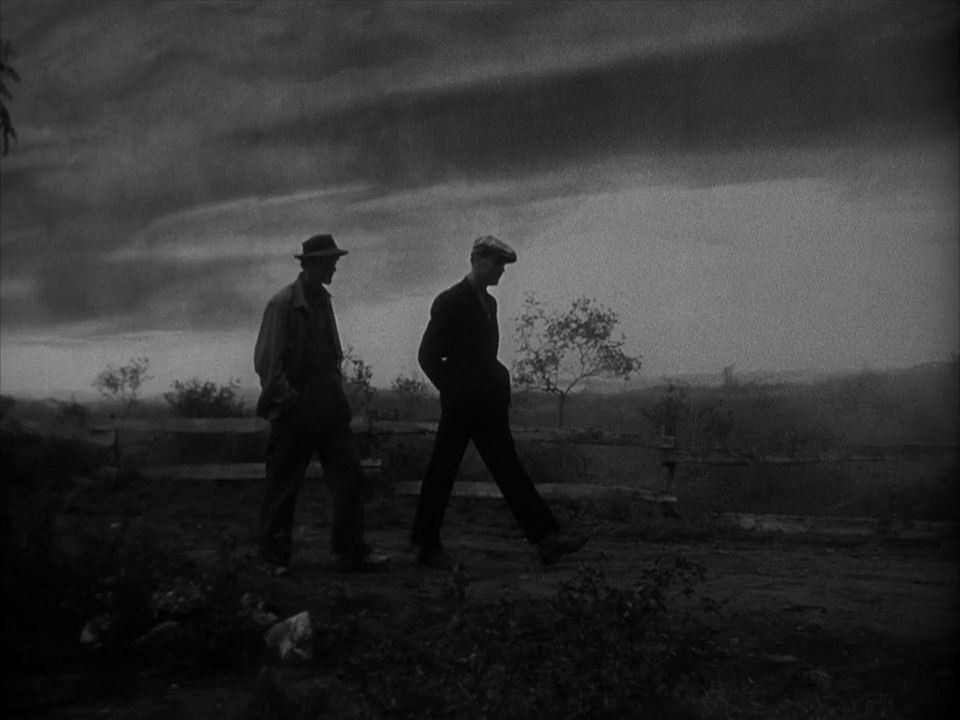
An Oklahoma family, driven off their farm by the poverty and hopelessness of the Dust Bowl, joins the westward migration to California, suffering the misfortunes of the homeless in the Great Depression.
EN
“We keep a-comin. We’re the people that live. They can’t wipe us out. They can’t lick us. We’ll go on forever Pa, ‘cause we’re the people.”
Henry Fonda as Tom Joad
“After being overrated in its time as a social testament, it is now underrated both as a Hollywood movie (not glossily mythic enough) and as a Ford memento (not purely personal enough). What does stand up to every test of time, however, is Henry Fonda’s gritty incarnation of Tom Joad, a volatile mixture of prairie sincerity and snarling paranoia. […] His physical and spiritual stature is not that of the little man as victim, but of the tall man as troublemaker. His explosive anger has a short fuse and we have only his word for it that he is tough without being mean. Indeed, it is mainly his awkwardness in motion that suggests his vulnerability. His putatively proletarian hero becomes ominously menacing in that shadowy crossroads where social justice intersects with personal vengeance.”
Andrew Sarris1
“Zanuck has more than kept his word. He has a hard, straight picture in which the actors are submerged so completely that it looks and feels like a documentary film and certainly it has a hard, truthful ring. No punches are pulled – in fact, with descriptive matter removed, it is a harsher thing than the book, by far. It seems unbelievable but it is true.”
John Steinbeck2
Peter Bogdanovich: What attracted you to the The Grapes of Wrath?
John Ford: l just liked it, that’s all. I’d read the book – it was a good story – and Darryl Zanuck had a good script on it. The whole thing appealed to me – being about simple people – and the story was similar to the famine in Ireland, when they threw the people off the land and left them wandering on the roads to starve. That may have had something to do with it – part of my Irish tradition – but I liked the idea of this family going out and trying to find their way in the world. It was a timely story. lt’s still a good picture – l saw part of it on TV recently.
Gregg Toland did a great job of photography – absolutely nothing but nothing to photograph, not one beautiful thing in there – just sheer good photography. I said to him, “Part of it will be in blackness, but let’s photograph it. Let’s take a chance and do something different.” lt worked out all right.
Had you planned to end with Fonda going up over the hill?
That was the logical end, but we wanted to see what the hell was happening to the mother and father and the girl; and the mother had a little soliloquy which was all right.
John Ford in conversation with Peter Bogdanovich3
- 1Andrew Sarris, The John Ford Movie Mystery (London: Indiana University Press, 1975), 97.
- 2John Steinbeck, “Letter, 12.15.39,” in Steinbeck: A Life in Letters, eds., Elaine Steinbeck and Robert Wallsten (New York: Viking Press, 1975).
- 3Peter Bogdanovich, John Ford (Berkeley: University of California Press, 1978), 75-78.
NL
“Wanneer Tom, gespeeld door Henry Fonda, tegen het einde van de film beslist om het ontheemde gezin ten slotte te verlaten en afscheid neemt van zijn moeder, begint het ingrijpende en onomkeerbare van hun situatie hem voor het eerst te dagen. Zijn moeder ziet minder in waarom de wereld hen plots zo weinig gunt, en vraagt hem nog hoopvol en naïef: ‘Later, when this is blowed over… you’ll come back?’ Maar de blik van Tom is onherroepelijk getransformeerd. Tot dusver kon hij zich nog vol vertrouwen een beter bestaan voorspiegelen, nu valt er op zijn gezicht iets heel anders af te lezen. De richting van zijn leven, die hem bij zijn geboorte nog was meegegeven, is hem nu volkomen onbekend. Als ontwaakt zien we Tom in het ijle turen. Het is een blik die het besef behelst dat zijn lot definitief gekenterd is. In deze verschuiving van gezichtspunt is de kijker getuige van Toms ontdekking van de geschiedenis. Afgesneden van een bestemd einde, ligt de kennis over zijn taak in deze wereld voor hem, ergens voorbij de historische horizon. In de volgende scène zien we Tom de ellenlange einder aflopen, belast en beladen met een nieuwe taak: ‘Maybe I can just find out something. Just scrounge around and maybe find out what it is that’s wrong… Fella ain’t got a soul of his own, just a little piece of a big soul. The one big soul that belongs to everybody.’”
Gerard-Jan Claes1

